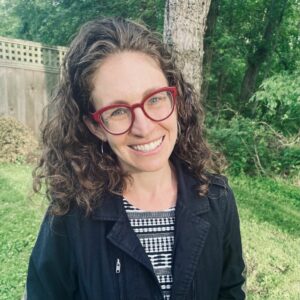
By Rabbi Nora Feinstein
I remember the excitement I felt when I finally learned the name of the Torah portion for my bat mitzvah: Terumah. Through the months of preparation, I was at turns enchanted and perplexed by the ancient text that sat, xeroxed and highlighted in the binder my synagogue provided to guide my studies.
My own enthusiastic reaction to this parshah contrasted with the response of knowledgeable, observant adults in my life. Their reactions could be summarized with compassionate shrugs. I particularly remember someone saying, “I hope you like reading lists.”
True, Terumah isn’t the most action-packed parshah, certainly not when compared to its companions in the Book of Exodus. It’s not about leaving Egypt or receiving Torah at Sinai. Rather, Terumah contains lists of donations and detailed instructions for the construction of the mishkan, or tabernacle, the mobile sanctuary where the Israelites will worship in the wilderness. It details the precious materials that will be used to construct the mishkan’s outer structure and its inner furnishings. And these building supplies, we read, will be brought by every person “whose heart moves them” (Exodus 25:2).
There’s one particular verse from this parshah that’s stuck with me through the years. Sitting modestly among the enumerated list of offerings, or terumot, that the God expects from the people, we encounter the following verse:
God says to Moses: Let them — the Israelites — make Me a sanctuary that I may dwell among them (Exodus 25:8).
By nature of each person bringing forward their unique gift, the people — through their collective action — enable the divine presence to dwell in their midst.
And so too, by extension, the inverse is also true: if each person doesn’t bring forward their offering to the project of community, then the divine presence cannot dwell among them.
Commenting on this passage, the medieval rabbi Ovadia Sforno imagines God explaining his vision to Moses. “I will dwell among them in order to receive their prayers and worship in the same way that I revealed to you my presence on the mountain.” In other words, by contributing and collaborating with one another, by offering their gifts to the community, the people actually have the capacity to tap into Sinai-level reverence. Together, they are able not only to experience but to co-create sanctity in a new way.
Perhaps this parshah’s contents are not quite as impressive as seas splitting or divine revelation and perhaps the instructions for constructing a tabernacle in the wilderness seem irrelevant to us. Nevertheless, its core message maintains relevance to our day-to-day lives. If each individual relinquishes the opportunity to contribute their unique gifts, how will the collective ever know sanctity or awe? It’s a message that our sages underscore in the Talmud, understanding that we need one another in order to enact holiness in the wilderness of life in the diaspora, too (BT Sanhedrin 39a, among others).
We are, all of us, navigating a time of great tenderness and anguish as Jewish individuals and as a Jewish people. And our parshah reminds us that each of us has a way of not only offering her gifts, but also of creating space for spiritual uplift and sacred connection with one another.
When we are able to see that our voices matter, that our contributions fit in with the vision for Jewish life moving forward, we, too, can feel invested in our communal project of building robust, healthy, connected Jewish communities. Just as the Israelites needed one another to access holiness, we also need one another to ensure vibrant Jewish life now and in the future, wherever our journeys take us.
Rabbi Nora Feinstein is a rabbi at Sixth & I in Washington, D.C.





